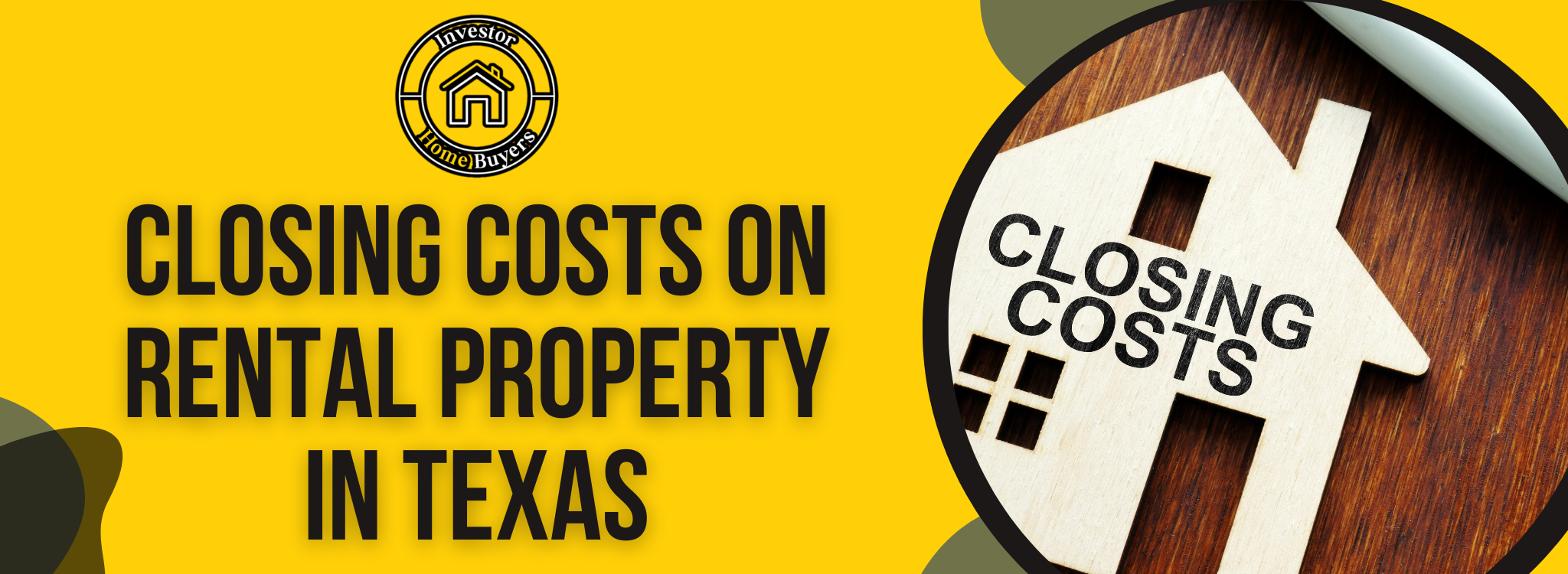
What are the Standard Closing Costs for a Rental Property in Texas?

Knowing the closing costs is important when buying a rental property in Texas. These costs can greatly impact your investment returns.
How Do Lender Fees Impact Overall Costs?
In Texas, lender fees are a big part of the closing costs for a rental property. Origination, application, and screening fees are a few examples. Different lenders charge different mortgage fees, so it’s smart to look at what different lenders offer. This way, investors can better understand the possible prices and make smart decisions.
What Role Does Title Insurance Play in Closing Costs?
Title insurance covers potential title issues or claims against the property. In Texas, having title insurance for rental properties protects against past title problems that could affect ownership. Although it adds to expenses, it offers essential protection and is usually required in real estate deals.
Are There Any Unique Texas-Specific Fees to Consider?
Investors should be aware of certain Texas-specific fees that may arise during closing:
- Texas closing fees: These might include attorney and other administrative costs specific to transactions in Texas.
- Texas escrow fees: Paid to the escrow company for handling the funds and documents related to the transaction.
- Texas deed recording fees: Charged by the county to officially record the new property deed.
Budgeting for these fees is key, as they can increase overall expenses.
How Can Investors Minimize Closing Costs?

Reducing closing costs can boost the profitability of your rental investment. Here are several strategies for investors to consider.
Are There Negotiable Fees During Closing?
You can talk about some closing costs. In Texas, you might be able to talk down some real estate transaction fees, such as some of the costs of renting a house. Talk to your lawyer or real estate professional about which fees might be lowered or dropped, which could save you money.
What Strategies Can Be Used to Reduce Costs Effectively?
To reduce closing costs:
- Shop around for lenders: Different lenders have varying fee structures and interest rates, so comparing them can lead to better deals.
- Bundle services: Combining inspections or appraisals through one provider can sometimes result in discounts.
By cutting costs from the start, you can save significantly over time.
Can Prepayment of Certain Items Lower Future Payments?
Some things, like prepaid interest and debt costs on a Texas rental property, can be paid for ahead of time to lower future payments. Paying these costs upfront can help manage finances better later. Consult financial advisors to see if this fits your investment goals.
Understanding and managing closing costs effectively is essential for making profitable real estate investments in Texas. Working with professionals experienced in Texas real estate transactions can offer valuable insights and guidance when navigating situations like the Short Sale of Rental Property.
Comprehensive Breakdown of Closing Cost Components
How Do Appraisal and Inspection Fees Compare?

When buying a rental property in Texas, knowing the differences between appraisal and inspection fees is important.
- Appraisal Fees: To determine a property’s market worth, licensed appraisers bill these fees. The fees can change depending on the area and complexity, and are needed for loan applications. In Texas, assessment fees can greatly influence rental properties’ financial situation.
- Inspection Fees: These fees cover the cost of a professional inspection to assess the property’s condition. While appraisal fees determine value, inspection fees focus on uncovering potential issues or necessary repairs. The cost of inspections for rental properties in Texas varies, but it is crucial for avoiding unexpected expenses after purchase.
What are the Standard Loan Origination Fees?
Loan origination fees are costs in processing a mortgage application, which can affect your investment in a Texas rental property.
- Standard Loan Origination Fees: These fees include charges for processing your application, underwriting, and funding your mortgage. Understanding these lender fees is essential to preparing for the total investment outlay when purchasing rental properties in Texas.
- Lender Fees for Rental Properties in Texas: Additional charges may be specific to rental properties. Knowing these mortgage fees helps with better financial planning and budgeting.
Do Legal Fees Vary Across Different Texas Regions?
Legal fees for closing a real estate transaction can differ significantly across Texas regions.
- General Attorney Fees: Hiring an attorney ensures all legal aspects of the property purchase are correctly handled. Real estate lawyer fees in Texas can fluctuate based on the transaction’s complexity and location.
- Regional Differences: Attorney fees for closing rental properties may vary in certain Texas areas due to local regulations and market conditions. It’s beneficial to obtain detailed quotes and conduct thorough research before proceeding.
How Do Closing Costs Affect Property Returns?
What Is the Impact on Cash Flow and ROI?

Closing costs directly affect your property’s cash flow and return on investment (ROI).
- Cash Flow Impact: These upfront costs can reduce initial cash flow. Evaluating Texas investor real estate costs helps forecast long-term profitability and manage current expenses.
- Effect on ROI: High closing costs can lower ROI by increasing the overall investment expense, impacting the rate of return. Investors need to consider these expenses to understand the true profitability of their Texas investment properties.
Are Closing Costs Considered in Property Valuation?
Understanding the influence of closing costs on property valuation is vital for investors.
- Valuation Inclusion: While closing costs don’t increase the property’s market value, they are pertinent to calculating the net value of the investment. Awareness of Texas closing fees for rental properties is important during real estate transactions.
- Transaction Fee Effects: Real estate transaction fees in Texas can alter perceived value, especially in competitive markets. This is critical when evaluating offers or adjusting sales prices.
Can Closing Costs Be Amortized Over Time for a Tax Advantage?
Amortizing closing costs can offer tax benefits for property investors.
- Amortization Benefits: Spreading costs over time can align expenses with the property’s income. This amortization of costs for rental properties in Texas can lead to more favorable tax outcomes.
- Tax Deductions: Not all closing costs are tax-deductible, but some can be, offering potential savings. Consulting with a tax professional can optimize tax strategies and identify which expenses are deductible.
By considering these factors, homebuyers in Texas can better manage closing costs and improve their investment strategy.
Why Is an Accurate Closing Cost Estimate Crucial?

How Do Unexpected Costs Influence Investment Decisions?
In Texas real estate, unexpected costs can heavily impact investment decisions. Real estate transaction fees and unforeseen rental property expenses can reduce potential profits. Investors often plan carefully but might face surprise costs, increasing the financial burden. Knowing these risks early on helps you make smart choices and set reasonable goals.
Which Tools Help in Accurately Estimating Costs?
To handle the complexities of real estate investing and ensure accurate cost estimation, several tools are invaluable:
- Cost Estimation Tools and Calculators: These are crucial for predicting expenses accurately.
- Real Estate Investing Software: Provides insights into property values and market trends.
- Property Management Software: Tracks rental income and expenses precisely.
- Accounting Software: Maintains detailed financial records and tax compliance.
Using these tools simplifies cost estimation and supports reliable financial planning.
Are Buyer’s and Seller’s Costs Always Separated Clearly?
In Texas, closing costs often have a clear separation between buyer and seller costs, although complexities exist:
- Buyer Costs: Usually include loan origination, appraisal, and insurance fees.
- Seller Costs: Typically cover the rental property’s commission, settlement, and administrative fees.
Understanding these divisions helps prevent disputes and ensures both parties know their financial responsibilities before closing.
Legal Aspects of Closing Costs in Texas

What Are the Essential Legal Documentation and Requirements?
In Texas, buyers and sellers must meet several legal documentation requirements:
- Deed Recording Fees: Necessary for officially transferring property rights.
- Title Insurance: Protects against claims or liens on the rental property.
- Attorney Fees: Ensure all legal aspects of the closing process are correctly handled, especially for rental properties.
These documents are key in ensuring a legal and smooth property transaction.
How Do Laws Differ for Residential Versus Commercial Properties?
Texas real estate laws vary between residential and commercial properties:
- Residential Properties: Usually follow different zoning laws and property tax rates.
- Commercial Properties: May have more regulations and higher tax obligations due to their nature and use.
Investors should understand these legal differences to avoid compliance issues and financial surprises.
Are There Penalties for Non-compliance with State Regulations?
Not following state regulations in Texas can lead to penalties:
- Non-compliance Penalties include fines and legal fees that affect the investment’s bottom line.
- Tax Deductions: Mishandling could result in losing valuable tax deductions.
Investors should work with legal experts to ensure full compliance and protect their investments from these risks. Engaging with knowledgeable professionals ensures that legal and financial aspects are well-covered, fostering trust and reliability.
Exploring Various Payment Options for Closing Costs
Can Closing Costs Be Rolled Into the Mortgage?

When you buy a house, you should find out if you can include the closing costs in your mortgage. This choice helps with managing up-front costs by spreading them out over the life of the loan. In Texas, closing costs can be different depending on whether you’re buying a home to live in or one to rent out. When you add these costs to your mortgage, your total debt and interest increase. Talk to your lender to determine what will happen and if this is a good idea for your finances.
What Are the Pros and Cons of Paying Closing Costs Upfront?
Paying closing costs upfront has benefits and drawbacks. It reduces your loan balance, resulting in lower monthly payments and no extra interest on those costs. However, paying out-of-pocket for expenses like appraisal fees can be financially demanding, particularly when buying a rental property in Texas. Evaluate your current finances carefully to decide if this method is right, balancing immediate affordability against long-term savings.
How Do Seller Concessions Work to Cover Closing Expenses?
To negotiate, the seller may agree to pay some of the buyer’s payment fees or other closing costs. This is called “seller concessions.” For those buying rental property in Texas, this can ease the financial load at closing. Successful negotiation requires clear communication with the seller and depends on current market conditions. You can negotiate better if you work with an experienced real estate professional.
Importance of Professional Guidance in Managing Closing Costs
Should You Hire a Real Estate Attorney for Closing?
In Texas, given the complexity of real estate deals, hiring a real estate attorney can be wise. Though real estate lawyer fees in Texas might appear as an extra expense, a skilled attorney covers all legal aspects. They help keep track of attorney fees at close and give important information that lowers risks. Legal advice is important to ensure you follow the rules and protect your interests when working with big investments like rental properties in Texas.
How Can Financial Advisors Assist in Cost Management?
Financial advisors are essential in managing expenses related to real estate. With expertise in wealth management, they create strategies to optimize tax deductions and expenses. By partnering with a financial advisor, you can devise a plan that aligns with your investment goals while easing financial stress during purchases. Their guidance helps you make informed choices and improve financial efficiency in managing closing costs.
Are There Benefits to Using a Real Estate Professional Specialized in Texas Markets?
Hiring a real estate professional who specializes in Texas markets offers numerous advantages. These agents understand local regulations, Texas real estate professional commission structures, and property management fees. Their knowledge of regional market trends gives you an edge, ensuring informed decisions. Working with an expert in Texas real estate leads to smoother transactions, personalized advice, and potentially better investment returns.
For efficient financial management and navigating the complexities of real estate transactions, seek professional guidance. Investor Home Buyers provides trusted information and support for your property investment needs.
Post-Closing Costs and Their Management
What Ongoing Costs Follow After Closing?

After closing on a property, managing ongoing costs is essential:
- Property Taxes: In Texas, property tax rates differ by location. Knowing local rates helps with budgeting.
- Homeowners Insurance: This coverage protects against unforeseen events. Premiums depend on property value and risk factors.
- Maintenance Costs: Regular upkeep, like repairs and landscaping, keeps property value steady.
- HOA Fees: If part of a homeowner association, expect regular dues for communal services and amenities.
- Rental Property Taxes in Texas: Rental properties might have different tax obligations than residential ones. Understanding these is key to financial planning.
- Home Warranty Fees: For rental properties, home warranties can cover unexpected repair costs, giving landlords peace of mind.
Are There Best Practices for Managing Maintenance and Operational Costs?
Managing maintenance and operational expenses effectively boosts profitability:
- Utilize Property Management Software: These tools streamline operations, track expenses, and ensure timely maintenance, reducing costs.
- Hire Professional Property Managers: Skilled management teams understand rental property intricacies, handling Texas property management fees and repair costs efficiently.
- Regularly Review Maintenance Schedules: Keeping up with inspections and preventative maintenance prevents bigger repair expenses.
- Budget for Repair Costs: Plan for future repair needs within your post-closing budget to avoid financial stress.
How Can Investors Plan for Unexpected Post-Closing Expenses?
Planning for unexpected expenses ensures successful property investment:
- Establish Escrow Funds: Reserves in escrow provide a buffer for emergencies like repairs or vacancies.
- Consult Financial Advisors: Advisors specializing in Texas investment property expenses can help craft a robust financial strategy.
- Create a Budget: A detailed budget allows precise planning of costs. Use a rental home closing checklist in Texas to avoid missing anything important.
Innovations and Trends Influencing Closing Costs
How Is Technology Reducing Time and Cost at Closing?
Technological advancements streamline real estate transactions:
- Online Platforms: These facilitate swift processing and tracking of closing documents and escrow funds, cutting down on physical meetings.
- Real Estate Transaction Fees in Texas: Automated systems lessen administrative burdens, saving time and costs during closings.
- Administrative Fees for Rental Properties: Technology optimizes these processes for transparency and efficiency.
Are Virtual Closures a Viable Solution for Texas Property?
Virtual closures offer practical options:
- Online Platforms and Tools: Digital communication helps real estate professionals guide clients through the mortgage process without meeting in person.
- Virtual Closings in Texas: These provide flexibility and reduce logistical challenges of traditional closings.
- Closing Costs Breakdown for Texas: Virtual environments ensure clarity in the breakdown of costs.
What Role Do Online Platforms Play in Cost Comparisons?
Comparative tools are valuable for evaluating cost efficiencies:
- Utilize Comparison Tools: These allow investors to compare lenders and property management software options, enabling informed financial choices.
- Analyze Mortgage Fees for Rental Properties: Clear comparisons reveal potential savings across services.
- Examine Texas Escrow Fees for Rental Properties: Understanding these costs helps select economical and effective service providers.
By following these insights, investors can confidently manage property-related complexities.
FAQs:
What are the typical closing costs for rental property in Texas?
Closing costs for rental properties in Texas typically include lender fees, title insurance, appraisal fees, and escrow funds. It’s important to budget for these expenses to ensure a smooth transaction.
Are closing costs in Texas tax-deductible?
Some closing costs, like mortgage interest and property taxes, may be tax-deductible. Consult with a tax professional or check IRS guidelines for precise information.
What is involved in the title search process for rental properties in Texas?
A title search verifies the property’s legal ownership and checks for liens or disputes. Ensuring a clear title protects your investment and is crucial before finalizing a purchase.
How do mortgage discount points impact closing costs?
Mortgage discount points are prepaid interest that can reduce your loan’s interest rate. They increase initial closing costs but can lower long-term payments.
Can I negotiate closing costs when buying a rental property in Texas?
It is possible to negotiate. Sellers might agree to pay some costs or give points. Talk with your real estate professional about your choices to see where you might be able to save money.
What insurance premiums should I consider for a rental property in Texas?
Consider homeowners insurance and possibly flood insurance for protection. Landlord insurance covers rental-specific risks, offering comprehensive coverage.
How does depreciation affect tax deductions on rental properties?
Using depreciation, you can write off the property’s normal wear and tear over time. This can have a big effect on your yearly tax benefits, which means that less of your rental business income is taxed.
What are the typical fees associated with refinancing a rental property in Texas?
Refinancing costs can include loan origination fees, appraisal fees, and title insurance. Always calculate if long-term savings outweigh these upfront costs before proceeding.
Key Insights
- Fees for mortgages, evaluations, and inspections are often part of the closing costs for a rental property in Texas. These are needed to figure out how much the property is worth.
- Understanding property taxes in Texas and recognizing possible tax deductions like mortgage interest and insurance premiums is crucial for managing wealth efficiently.
- Title search and title insurance ensure clear property ownership and are mandatory closing expenses in Texas.
- Effective negotiation can lower costs such as lender fees, origination fees, and other third-party charges at closing.
- Consider the tax effects, including capital gains tax and depreciation, when planning your investment strategy for rental properties.
- Protect your investment with homeowners insurance and flood insurance, considering that homeowners association (HOA) fees can vary greatly.
- Prepaid costs like prorated property taxes and insurance premiums need to be included in the closing costs of rental properties in Texas.
- Lenders often require escrow funds to cover future expenses, including property taxes and homeowners insurance.
- Additional administrative costs in Texas for closing a rental property may include real estate lawyer fees, notary fees, and brokerage fees.
- Using amortization and tax-deferred strategies can offer financial benefits when refinancing or investing in rental properties in Texas.
Keep reading to learn how to sell a house in Texas. This information applies to cities like El Paso, Houston, Dallas, Austin, San Antonio, Fort Worth, and nearby areas. For more help, contact us at (214) 253-4544.
Resources To Help You Sell A House in Texas

